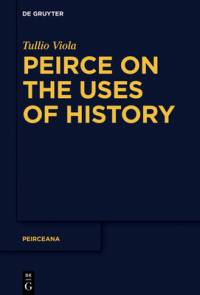Om Peirce on the Uses of History
The present book is the first to undertake a systematic study of Peirce¿s
conception of historical knowledge and of its value for philosophy. It does
so by both reconstructing in detail Peirce¿s arguments and giving a
detailed account of the many ways in which history becomes an object of
explicit reflection in his writings.
The book¿s leading idea may be stated as follows: Peirce manages to put
together an exceptionally compelling argument about history¿s bearing on
philosophy not so much because he derives it from a well-articulated and
polished conception of the relation between the two disciplines; but on
the contrary, because he holds on to this relation while intuiting that it
can easily turn into a conflict. This potential conflict acts therefore as a
spur to put forth an unusually profound and multi-faceted analysis of
what it means for philosophy to rely on historical arguments.
Peirce looks at history as a way to render philosophical investigations
more detailed, more concrete and more sensitive to the infinite and
unforeseeable nuances that characterize human experience. In this way,
he provides us with an exceptionally valuable contribution to a question
that has remained gravely under-theorized in contemporary debates.
Visa mer

